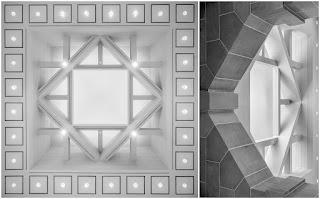"There have been and still are geometricians and philosophers, and even some of the most distinguished, who doubt whether the whole universe, or to speak more widely the whole of existence, was only created in Euclid's geometry; they even dare to dream that two parallel lines, which according to Euclid can never meet on earth, may meet somewhere in infinity. I have come to the conclusion that, since I can't understand even that, I can't expect to understand about God. I acknowledge humbly that I have no faculty for settling such questions, I have a Euclidean earthly mind, and how could I solve problems that are not of this world? And I advise you never to think about it either, my dear Alyosha, especially about God, whether He exists or not. All such questions are utterly inappropriate for a mind created with an idea of only three dimensions."
- Fyodor Dostoyevsky (1821 - 1881)
Brothers Karamazov









